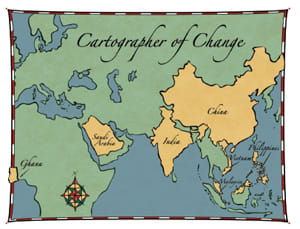
Lois Engelbrecht doesn’t talk much about what happened to her when she was 6 years old, a student at a boarding school nestled in a beautiful mountain range in southern India. It was 1961, and her parents were American missionaries working in India to improve medical conditions and open up a dialogue between Muslims and Christians.
It’s not that Engelbrecht is ashamed. She knows the sexual abuse she suffered for years at the school was not her fault. She’s simply too focused on today—on the sexual abuse still being suffered by children around the world—to talk much about her yesterdays.
Since founding the nonprofit Center for the Prevention and Treatment of Child Sexual Abuse in 1993, Engelbrecht has helped create systems of prevention and response in 394 schools in the Philippines, Malaysia, China, India, Saudi Arabia, and Vietnam.
“There are often good laws about sex trafficking, but not enough related to what happens to children in their families and communities,” says Engelbrecht, who earned her PhD in Human Services from Walden in 2010. “So I created an agency to focus on abuse within families and communities.”
Her approach is to go in, learn the culture, find the right partners, help out, and then train them to carry on the work once she’s gone. Every time she must learn new societal norms while also challenging them. She doesn’t just franchise her program; she adapts it to the mores of each country and community she enters.
Though this work has kept her firmly focused on the present, she has recently allowed herself to recognize its direct link to the past—and its ability to heal not just the wounds of others, but her own.
“I have protected myself emotionally for so long that these cases, by themselves, did not find their way through my protective barriers. But five years ago, when my mother died, it really hit me,” she says. “There was no support when it happened to me. When children are in trouble, they have to have access to somebody who can help them. I want to help make that possible.”
Engelbrecht was born in India during her parents’ mission there and attended a boarding school. Every Sunday the students were required to go into the dining room and write a letter to their parents. In one letter, Engelbrecht wrote about how some older children had tied her hands and hung her from a rafter. The boarding mother who read the letter forbade Engelbrecht to send it. “I got into big trouble,” she recalls. “We all learned that we could not communicate anything negative to our parents.”
After graduating from high school, Engelbrecht took a year off to study Indian music and dance and then went to college in Indiana to earn her degree in social work. After that, she went back home to India and met her future husband, Dennis, an international educator. His work requires a great deal of travel and relocation, so theirs is a transient life.
In 1984, the couple moved to Hong Kong, where Engelbrecht worked with Vietnamese refugees through a Salvation Army program. It wasn’t until she and her husband moved to Manila, Philippines, in 1988, and she began working in a Lutheran church program, that the idea for her nonprofit started to take shape.
It seemed that no matter where she went in the city, she encountered children begging in the streets and looking for little jobs. As a social worker, she felt moved to talk to them and help them get back into the school system. In these discussions, she learned that many of the children had been sexually abused.
“They didn’t know what to do, and there weren’t necessarily any services for these children,” she says. So in 1993, she formed the Center for the Prevention and Treatment of Child Sexual Abuse in Manila.
Engelbrecht’s first big case came in 1995 through her affiliation with the Lutheran church, where the agency conducted its first pilot test to work in schools in the Philippines. An 11-year-old boy had complained that his school’s contractual karate teacher had touched him inappropriately. School administrators were baffled. The concept of sexual abuse was a foreign one, even in the capital city. There were clear laws in place to protect victims of sexual trafficking, but most judges, police officers, and social workers were unfamiliar with the laws regarding child molestation. That meant that the majority of cases were mishandled or brushed aside.
In this case, the school was part of a church community whose leaders decided they would handle the situation internally by requiring the karate teacher to ask for forgiveness. But the man refused to admit any wrongdoing and quickly went into hiding. The school administrator who had hired him was distraught and ended up in the hospital.
Engelbrecht, who felt it was her duty as a social worker, helped create a system of prevention and response by enlisting the government as a partner and by teaching the school’s personnel how to better prevent abuse, spot victims, and provide the right support.
She found allies in the school and the community to help create an improved system for recognizing and treating child molestation. She also recognized the importance of getting buy-in from the government.
“As a result of our intervention and 14 years of hard work, the government has stepped in and mandated that all schools must teach children personal safety and protective behaviors, and this must be supported by community-based multidisciplinary teams,” she says. “Our role was to be there every step of the way and to train the teachers, the parents, and the community. We created the necessary support system. The first time a teacher and a parent talked through tears about the impact of the project on them and requested that they take it further—that’s when we knew we’d really done our job.”
Engelbrecht and her husband stayed in Manila until 1996, when they decided to relocate, and he took a job at the International School of Kuala Lumpur in Malaysia. Almost as soon as they arrived, Engelbrecht was out looking for an opportunity to bring her programs and ideas to her new community.
“As a good social worker, you have to try to meet everyone and knock on everyone’s door,” she explains. “I knocked on so many doors. They’d say, ‘This is very interesting. We’ll look at your materials but you should talk to this other person.’ So I’d leave my materials behind and go to the next place. And then I’d get the same story.”
She was an outsider, a foreigner. And she quickly learned the importance of humbling herself and showing deference to the local culture and leaders. Too often, Westerners approach other cultures with preconceived notions and the assumption that they know best, she says.
“It’s better to say, ‘I’m here, what do you need? How can I facilitate what you need?’ ” she explains. “But I don’t want to just be a facilitator. I very much want to be a part of the action.”
Eventually she found people who were working to stop sexual abuse in Malaysia, and Engelbrecht was asked to replicate the program she’d created in the Philippines. This was particularly challenging, given that the country has at least three distinct religious cultures that all address similar problems differently. So she had to find people on the ground who could help her bridge the gaps.
“You need to find people who already have the leadership skills,” she says. “I’m like the missionary. I find all the research, and I find the right people to give it to, but then it’s up to them to determine how it impacts them and what we can do together.”
In 2000, her husband was hired as a superintendent of the American International School–Riyadh in Saudi Arabia, so the couple again relocated. It was during her time there that Engelbrecht decided to pursue her Ph.D. at Walden. She’d read about the university in a professional journal and felt that the school’s online structure would be a perfect fit for her nomadic lifestyle.
Living in Saudi Arabia also presented its own challenges: Women were given only restricted access to places like libraries. “But I loved that I could make my own program and not have to sit in a class,” she says. “I really was able to tailor it for what works best to meet my needs in my rather unique situation.”
Engelbrecht was able to direct her research to help her achieve the goals of her nonprofit organization, which in turn made her a better social worker, advocate, and authority on the subject—and reminded her that there’s always more to learn.
While in Saudi Arabia, Engelbrecht applied for and received a grant to bring her programs to Hanoi, Vietnam, where her brother lived. She traveled there frequently and founded the Prevent Child Sexual Abuse Project, the first of its kind in Vietnam.
She also frequently returned to Manila to work on her dissertation, which focused on the empowerment of social workers in the Philippines.

Social workers are often the ground-level change agents in any community, she says, but in countries like the Philippines, the career is considered low in the professional hierarchy. “They are not empowered to do what they need to do,” she says. “My dissertation is designed to empower social workers. I worked to develop a theory to figure out what we need to do and put it into practical pieces. Then I take that to other organizations.” As a result of her research, Engelbrecht created a map anyone—in any country—can follow to implement the principles of her nonprofit.
She continued traveling between Saudi Arabia, Vietnam, and the Philippines until 2005, when the couple moved again, this time to Shanghai, China. Engelbrecht had expected to spend almost all her time on her degree and dissertation, but after stumbling upon a discussion on a Listserv for social workers in China, she was asked to speak at a conference on the prevention and treatment of child abuse. That speaking engagement led a local advocate to seek out her help in creating training and awareness programs in Shanghai.
Four years later, the couple moved to Ghana, where they currently live. Engelbrecht is again attempting to replicate her program in the country’s schools.
But even with her widespread success as a calling card, Engelbrecht must still sell herself and her services, given that awareness of child sexual abuse in Ghana is fairly new and any advocacy movements are in their infancy.
Despite the significant obstacles, Engelbrecht is unwilling to give up. She has connected with several Lutheran schools and will work with them to start a pilot program. “I’ve been told that they’re not ready and it can’t be done, but I will prove it can be done,” she says. “I’ve made it my mission to use my talents to benefit the world.”
And in doing so, she’s been able to mend her own heartbreaks, bit by bit. “It’s like therapy,” she says. “When it happened to me, there was nothing you could do to stop it. Now, I can do something.”
Want to positively impact your community? The Walden Service Network offers opportunities to volunteer locally and globally.



